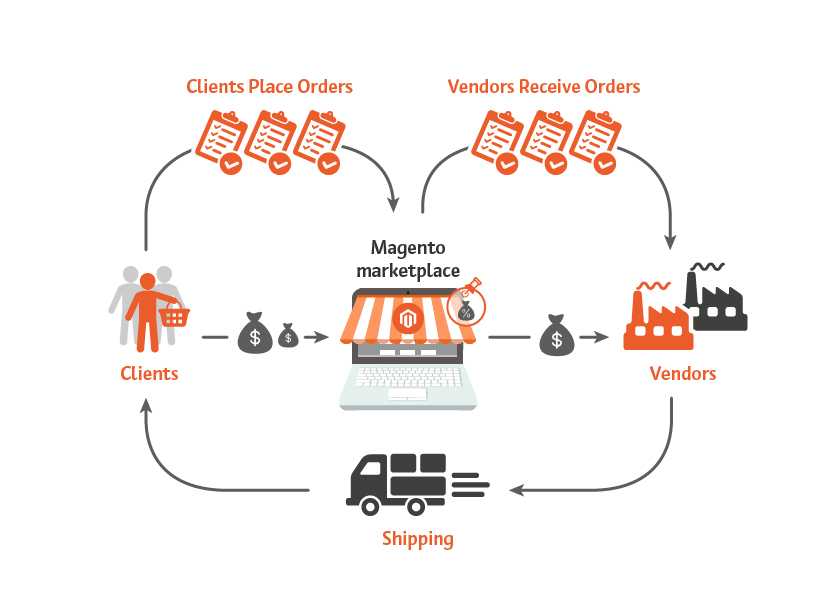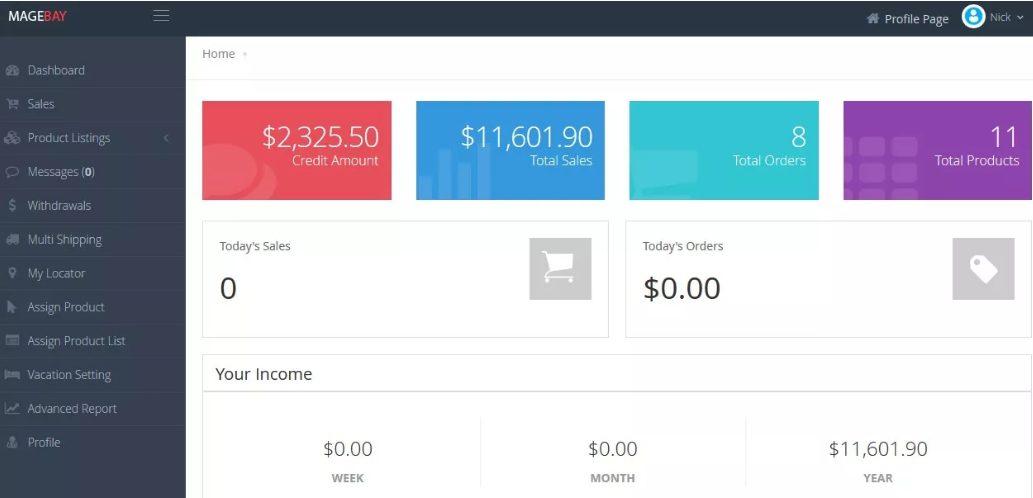What is magento market extension , how it works ?
- Font size: Larger Smaller
- Hits: 4982
- 0 Comments
- Subscribe to this entry
- Bookmark
What is a marketplace? While e-commerce world is a fast-growing phenomenon on its own, marketplaces and various B2C portals are more than ever in the heyday of their glory. Have you ever shopped at Ebay or Amazon? These are the world biggest online marketplaces. Speaking figuratively, marketplace is like an online shopping mall where anyone can sell anything to anyone and anywhere in the world. It is a cost effective solution where individuals and small businesses can sell their products easily and expand their reach while building their brand. This is a great way to jump start your online business and start increasing your revenue right away.
How it works? Speaking about the technical side of the subject – marketplace unites users selling various types of products. From the first glance it looks like a conventional e-store, but the process behind the curtains is different. When a customer lands on a product they want to buy and clicks “Add to cart” (directly or searching via Google), the marketplace system places an order through the seller (vendor) who has that product and the seller subsequently completes the order by sending shipment to the customer. Payment is handled by the marketplace via payment gateways it’s integrated with. Sellers have their own accounts (paid or free, depends on the marketplace policy) where they manage all sorts of things like product listings, pricing, shipping policy, sales reports, feedbacks, etc. Depending on the marketplace, sellers are charged a percentage from their revenue with/or without a monthly subscription fee.

What to sell at marketplace? People sell various stuff on the web: anything from a hairpin to a car or even a plane. Huge marketplaces as eBay or Amazon don’t limit their product categories to only real or virtual items (ie books, CDs) and allow selling all kinds of services like consulting, music composition, interior design and even computer repairing.
TURNING YOUR MAGENTO STORE INTO MARKETPLACE
So – what does Magento have to offer? In fact, Magento doesn’t offer any ready-made easy-to-install with no-coding-required solution but there are a few extensions I would like to talk about that may facilitate your marketplace development.
The marketplace extensions available out there may seem very similar to each other at the first glance, but our in-depth inspection and own experience have revealed some individual peculiarities. Some modules are fairly priced, some are madly expensive, but before you draw a decision to spend a fortune – take some time to carefully consider all pros and cons and learn about the advantages, as well as flaws and limitations.
MAGEBAY MAGENTO MARKETPLACE
Price: Only $299 - $999
Magento 2 is best eCommerce platform. It is flexible and suits best for big businesses . Magento powers amazing shopping experience, support mobile very good. And Magebay Marketplace Multi Vendor will convert your magento store into marketplace quickly.
- Top Best Features of Magebay Mutli Vendor Extension
- Support almost Product Type Support: Simple, Virtual, Configurable, Downloadable
- Vendor can manage products, orders, transction via their vendor dashboard.
- Admin can setup commission for each vendors, special categories , special products via product attributes
- Allow seller import bulk products via file csv.
- Allow customers compare prices from multiple vendors
- Support Return Merchandise Authorization (RMA) System
- Fully compatible with PDC and BKP
- See more detail : https://www.magebay.com/magento-multi-vendor-marketplace-extension
Quick View on

WEBKUL MULTI-VENDOR EXTENSION
Price: $349
One more marketplace extension developed by yet another Indian company. Its features are pretty similar to the Aaptha’s: user registers in the front-end in a conventional manner with the option to become a seller right away or later. Vendors get their individual branded store pages with the collection of the products, transaction list, reports, reviews, etc. In addition, there is also affiliate functionality available. However, some essential things like automated commission payment, adaptive payments (splitting the payment between store admin and vendors), split shopping cart are missing and you will have to spend more money to purchase those add-ons.
Also, there’s a chance you will spend more time and effort to fix a few bugs that appear here and there, especially with installing every extra add-on. Support is very responsive, indeed, and you will find many nice reviews for this company on Magento Commerce website, but the amount of bugs you are likely to find will require much more time and money investment than you might have originally planned. We have done several projects using this marketplace extension and experienced a few issues related to poor coding or inconsiderate logic.
WEBKUL B2B MARKETPLACE
Price: $499
Yet another marketplace from Webkul studio, but this time it’s aimed for businesses cooperating with businesses: bulk orders, big quantities, big money. And big challenges, of course. We have already mentioned that the quality of code in these Webkul extensions will not impress you much, but let’s do some justice to this team: their extensions provide good solutions for many typical business needs, and maybe if you could put up with certain inconveniences – this might be just what you have been looking for.
The idea of B2B marketplace is similar to that of B2C, but before any deal is closed (that is, the order is placed) there is some more interaction between the buyer and the seller. Suppose you want to buy 10,000 t-shirts. Even if you found a vendor to fulfill such a bulk order you probably will want to negotiate the quote and the timeline, while the seller will want to make sure they are capable of delivering such quantity in the specified timeframe. Webkul translated this business process into their B2B marketplace extension which has a separate login for retail and wholesale buyers, mass product upload using CSV file, conversation mode between store admin and both buyers/sellers, “request quote” feature for buyers and RMA return management.Marketplace admin can approve sellers/buyers, review/approve products, manage RMAs, set commission rate, view quotes and conversations.
You might not find all the features required specifically for your business, but all in all it’s a good B2B marketplace extension to start with.
UNIRGY
Price: from $1650
This is one of the best and most powerful marketplace extensions in our opinion. Its developer worked hard to create a very cool product, that’s why he shows the demo to public only after you submit a request.
Base package will cost you $1650 per license and various add-on features will add approximately $300 each. Among them are Vendor Payouts that allow generating vendor payment manually or automatically, bundled payout method with PayPal, custom payout methods. SplitRate add-on will make it possible to split products in the shopping cart by vendor and ship them individually per vendor product group.
If you include all the features into your extension the price for a single domain installation will make approx $5000. The code is open-source but the license part is encrypted, and that shouldn’t hurt at all, hopefully.
However, this extension is not very straight-forward for a store administrator. It has far too many settings in various parts of admin backend – sometimes it’s not very clear to understand where to configure what. Unirgy provide a one-hour video tutorial but frankly speaking it doesn’t help much. By default there is no registration form for sellers – quite an unexpected feature! On the other hand, there are a lot of settings to configure for a vendor, a very powerful tool for vendor-customer-admin communication. If you go with a MicroSite add-on – you will be able to provide your vendors an ability to link their domain with their microsite and install their own theme, however, shopping cart and checkout will still use marketplace standard design. In general vendor settings and features are extremely flexible here.
The coding quality of this marketplace extension is very good and it’s very nice to customize it, but be prepared to spend a few days or more just learning how to configure various features and functionalities and learn to deal with them in the future, too.
There are some more modules at Magento Connect that can help you turn your website into a marketplace and we have covered only the most interesting ones from our point of view. As you can see, there hardly exists a silver bullet, however it seems quite reasonable to invest certain amount of money into buying and customizing the extensions available to have a full control of what is happening in your marketplace, add new features
#Related post :
